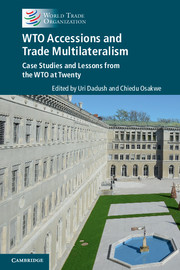Book contents
- Frontmatter
- Dedication
- Contents
- List of contributors
- Foreword
- Acknowledgements
- List of abbreviations
- Editors' note
- PART I WTO accessions, the trading system and the global economy
- PART II Overview: systemic outcomes from accessions
- PART III Members’ perspectives on accession negotiations
- Original members
- 12 WTO accessions from a member's perspective: safeguarding the rules-based system
- 13 WTO accessions: a market access perspective on growth – the approach of the European Union
- 14 WTO accessions: a rules perspective on growth – the approach of the European Union
- 15 WTO accession negotiations: trends and results in agriculture plurilaterals
- Article XII members
- PART IV Working party chairpersons’ perspectives on accession negotiations
- PART V Salient features inWTOAccession Protocols
- PART VI Conclusion
- Annex: Contributor biographies
- Index
- Plate section
- References
15 - WTO accession negotiations: trends and results in agriculture plurilaterals
from Original members
Published online by Cambridge University Press: 05 November 2015
- Frontmatter
- Dedication
- Contents
- List of contributors
- Foreword
- Acknowledgements
- List of abbreviations
- Editors' note
- PART I WTO accessions, the trading system and the global economy
- PART II Overview: systemic outcomes from accessions
- PART III Members’ perspectives on accession negotiations
- Original members
- 12 WTO accessions from a member's perspective: safeguarding the rules-based system
- 13 WTO accessions: a market access perspective on growth – the approach of the European Union
- 14 WTO accessions: a rules perspective on growth – the approach of the European Union
- 15 WTO accession negotiations: trends and results in agriculture plurilaterals
- Article XII members
- PART IV Working party chairpersons’ perspectives on accession negotiations
- PART V Salient features inWTOAccession Protocols
- PART VI Conclusion
- Annex: Contributor biographies
- Index
- Plate section
- References
Summary
ABSTRACT
Thirty-three members have acceded to the WTO since it was established in 1995. In the majority of these accession negotiations, reforms to the agriculture sector have featured as a particularly sensitive issue for acceding governments. Why is this the case? What are the existing members’ expectations of acceding governments in relation to agriculture? And how have acceding governments fared through this process? While agriculture trade accounts for less than 10 per cent of world merchandise trade, the agriculture sector, particularly for many developing countries, can be significant in terms of its contribution to both gross domestic product and employment.
For many acceding governments, accession marks a time of transition and more significant reforms to the economy. The agriculture sector tends to be one where there is a slower adjustment time-frame. Support to the agriculture sector is often perceived as having an important redistributional aspect. Governments also often act to protect their domestic agriculture markets from international prices (Anderson et al., 2013).
Agriculture sector reforms are not only challenging at the domestic level; the inclusion of specific rules for agricultural trade in the multilateral trading system is also a relatively recent phenomenon, with the introduction of the WTO Agreement on Agriculture (AoA) during the Uruguay Round of multilateral trade negotiations.
The AoA was an important step in international trade rules which sought to establish an effective long-term reform process for agriculture trade which had historically been the subject of numerous distortions and had experienced little market opening, in contrast to industrial goods (Croome, 1999).
While negotiations on agriculture in accession have been difficult, as demonstrated here, acceding WTO members generally join with minimal trade-distorting forms of support.
What are members looking to achieve during negotiations with acceding governments on agriculture?
In negotiating with acceding governments, existing WTO members are looking for their acceding partners to take on board a general commitment to the agriculture reform process as embodied in the AoA.
The preamble to the AoA contains the long-term objective ‘to establish a fair and market-oriented agriculture trading system and that a reform process should be initiated through the negotiations of commitments on support and protection and through the establishment of strengthened and more operationally effective GATT rules and disciplines’.
- Type
- Chapter
- Information
- WTO Accessions and Trade MultilateralismCase Studies and Lessons from the WTO at Twenty, pp. 425 - 438Publisher: Cambridge University PressPrint publication year: 2015



